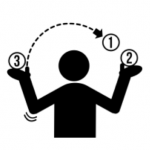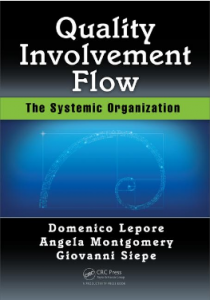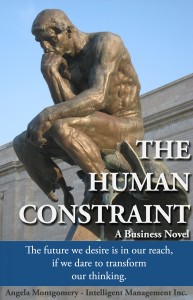It’s not a trick, a gimmick or a quick fix recipe. It’s a way of thinking, a mindset; some would go as far as saying it’s a way of being.
The revolutionary nature of Goldratt’s approach to Project Management often gets lost. In this post, we look at just one of the crucial aspects that distinguishes Critical Chain Project Management. This aspect alone, if truly adopted, will have a major impact on what individuals and organizations are able to accomplish with the time and resources they already have available.
Abandon multi-tasking
Do it right now and do it significantly. You will see the results almost immediately and increase productivity. That’s it. That’s the one thing you can do right now to have a drastic improvement in your performance. A client of ours introduced no multi-tasking for 3 hours per day recently. They were both delighted and dismayed. Delighted to discover how quickly they were able to get rid of a backlog of work and realize how much more work they could take on with the same resources, dismayed to think about how much time had been lost through people being unnecessarily interrupted/distracted while working on key tasks. Everyone was working very hard but achieving much less than potentially possible. But this does not have to be an exercise in self-criticism. It’s just important to be aware of the deep impact of removing multi-tasking from daily efforts. Moreover, studies have shown for some years now that multi-tasking actually damages the brain (See a great article from Larry Kim on this: ‘Multi-tasking is Killing Your Brain’).
Change Your Thinking, Change Your Life
Removing multi-tasking is just one element of working in a systemic way. At Intelligent Management, we’ve been working for over 20 years on spreading the word about the positive impact a systemic approach can have on management. Never like today, with the degree of complexity we all face, is this kind of thinking urgently needed. We are immersed in an onslaught of data and stimuli that can undermine even the most determined efforts. The work of W. Edwards Deming and Eliyahu Goldratt, two giants of management thinking and implementation, provide a complete approach to systemic management for today’s needs. We have just released our new book with CRC Press, New York that covers all the aspects of systemic management for radical improvement of performance producing win-win results that are more sustainable and, indeed, more ethical. It’s called ‘Quality, Involvement, Flow: The Systemic Organization‘ and you can find it on Amazon and from the publisher here: https://www.crcpress.com/Quality-Involvement-Flow-The-Systemic-Organization/Lepore-Montgomery-Siepe/p/book/9781498755887
The Human Element
We have also produced a digital business novel plus online Knoweldge Base, for those who prefer to learn through narrative, called ‘The Human Constraint’. This story looks in particular at how it is the individual’s way of framing reality that ultimately influences the goals we try and achieve. It is available for download exclusively from our website at www.thehumanconstraint.ca
By consistently seeing a bigger picture and fostering the ability to see connections and implications we otherwise would not, we can build more robust and sustainable solutions for businesses and communities. Please join us in spreading the message about how a systemic approach to thinking and managing organizations can have a positive impact not just on businesses, but on the entire ecosystem in which those businesses are embedded.
Sign up to our blog here and shift your thinking towards broader, systemic possibilities for yourself and your organization.
About the Author
Angela Montgomery Ph.D. is Partner and Co-founder of Intelligent Management, founded by Dr. Domenico Lepore. She is co-author with Dr. Domenico Lepore and Dr. Giovanni Siepe of ‘Quality, Involvement, Flow: The Systemic Organization’ from CRC Press, New York. Angela’s new business novel+ website The Human Constraint looks at how Deming and the Theory of Constraints can create the organization of the future, based on collaboration, network and social innovation.








Thanks for the advice. It reminds me of the method I’ve been using for a long time, I mean Kanban that may be introduced immediately in many environments like showed on http://kanbantool.com/kanban-library/implementing-kanban/kanban-in-4-easy-steps here 🙂 More, it includes abandoning multi-tasking and helps to value people more, so the same goals as above! 🙂